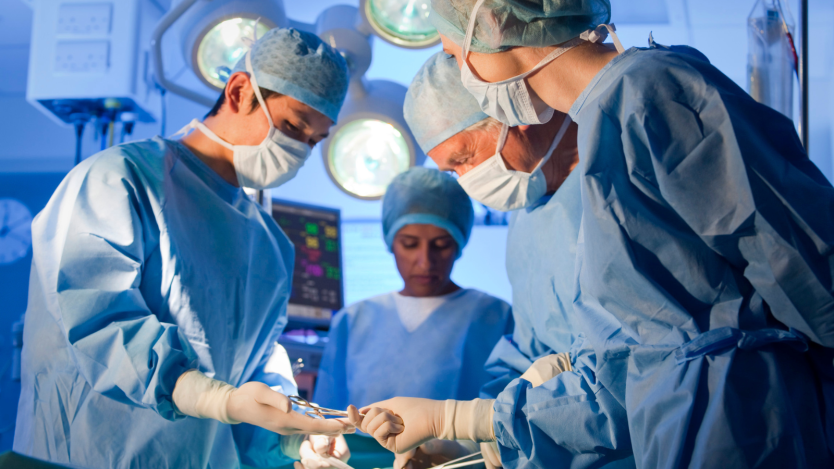Possible complications and risks of an Inguinal Hernia surgery

- After Inguinal Hernia surgery
- Complications of a non-treated inguinal hernia
- Possible risks during Inguinal Hernia surgery
After Inguinal Hernia surgery
- The complications or risks of Inguinal Hernia surgery can be divided into preoperative, intraoperative and postoperative.
- Although any possible complications of Inguinal Hernia repair are minimal and very rare.
- Most complications are more common in recurrent hernias than in primary hernias.
In order to discuss the complications, risks and any potential problems associated with inguinal hernia or its surgical repair, we will divide the complications into three elements, differentiating between those that occur before, during and after surgery.
Generally speaking, it is possible to state that the possibility of complications is greater when treating a recurrent inguinal hernia, i.e. one that has already been operated on and has reoccurred, than in those treated the first time ever.
Complications of a non-treated inguinal hernia
One of the main reasons for undergoing Inguinal Hernia surgery is to avoid the complications that can occur due to this problem, as they can be very dangerous. Among these complications we can find:
Intestinal occlusion
When part of the intestine is introduced into the hernia sac, there is a possibility that the correct intestinal transit will be impeded and pain, nausea and vomiting may occur. In these cases, emergency surgery may be required, so prevention is very important when speaking about an hernia problem.

Intestinal subocclusion
The functioning of this complication is practically the same as in the case of intestinal occlusion with the difference that intestinal transit is subsequently restored. Symptoms also include abdominal pain, nausea and vomiting. When the intestinal occlusion is resolved, diarrhoea occurs.
Incarcerated inguinal hernia
Incarcerated inguinal hernia occurs when the abdominal contents that come out forming the hernia sac are trapped on the outside and cannot be manually reintroduced into the abdomen. In these cases it is important to seriously consider scheduled inguinal hernia surgery as it is very likely that the hernia will go from incarcerated to strangulated, the latter being the most serious complication.
Strangulated inguinal hernia
The strangulated inguinal hernia is an incarcerated hernia with the difference that the tissue that has been trapped in the hernia sac suffers sufficient pressure to reduce the amount of blood supply that reaches it, and can cause serious problems such as ischaemia with subsequent necrosis of the contents of the hernia: this means that the tissue dies, and emergency surgery will be necessary to fix it.
If Inguinal Hernia surgery is performed urgently because of the strangulation of the contents of the abdominal wall, the chances of intraoperative complications are much higher than in a scheduled surgery.
Mortality in planned, i.e. non-emergency, Inguinal Hernia surgery is virtually zero.
If you are interested in having surgical treatment for your hernia problem and want to find our the cost of the surgery and the available techniques to perform it, you can learn more information here.
Possible risks during Inguinal Hernia surgery
When discussing the risks during Inguinal Hernia surgery, we are going to focus on the risks of scheduled surgery, which are the most common. These risks can be divided into the general risks of any surgery, which are those related to anaesthesia, infection, etc., and those strictly related to hernia repair.
General risks in Inguinal Hernia Repair
Complications of this type occur at practically the same frequency as in other types of surgery of similar severity. These complications are usually associated with anaesthesia and the patient's associated pathologies, in some cases related to advanced age.
These complications can be:
- Intestinal obstruction: This occurs transiently and is the functional interruption of the intestines preventing the passage of intestinal contents.
- Respiratory problems: Early ambulation and thromboembolic prophylaxis are important to prevent pulmonary embolisms.
- Urinary retention: Common in patients with benign prostatic hyperplasia, so it is best to solve this problem before inguinal hernia surgery.
- Infection: Infections are very rare if medical protocols are followed and their solution is simple. In very few cases, removal of the surgical mesh is required due to infection.
Most common risks in Inguinal Hernia Repair
- Haematomas: Small haematomas disappear in the following postoperative weeks, so the patient should be reassured. In the case of a large haematoma, drainage may be considered, but this is rare.
- Organ damage: Due to the area in which the surgery is performed, there is a possibility of injury to the bladder or bowel, although these problems are very rare.
- Testicular complications: Testicular pain may occur for a few weeks along with an increase in the size of the testicle. This usually resolves spontaneously but is best discussed with the surgeon if it occurs.

Complications after inguinal hernia surgery
The main postoperative complication of inguinal hernia is recurrence, which is the reappearance of the hernia in the same area. This can occur during the immediate postoperative period or after some time.
In order to avoid this situation, the best option is to listen to the specialist during recovery, follow his/her instructions, and avoid physical exertion, as this could lead to this problem and require further surgery.
In any case, it is important to note that recurrence is becoming less common, as are the other complications described in this article.
If you are thinking of having Inguinal Hernia surgery, remember that you can request an immediate, free surgical assessment consultation with one of our specialists in General Surgery.
Request your assessment consultation by clicking below:

Do you need inguinal hernia surgery?
Request a free and immediate appointment with our specialists in general surgery
Medical disclaimer: All the published content in Operarme is intended to disseminate reliable medical information to the general public, and is reviewed by healthcare professionals. In any case should this information be used to perform a diagnosis, indicate a treatment, or replace the medical assessment of a professional in a face to face consultation. Find more information in the links below:
